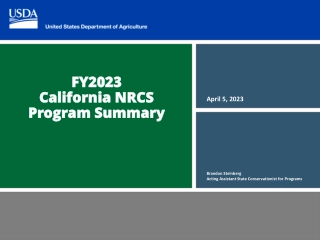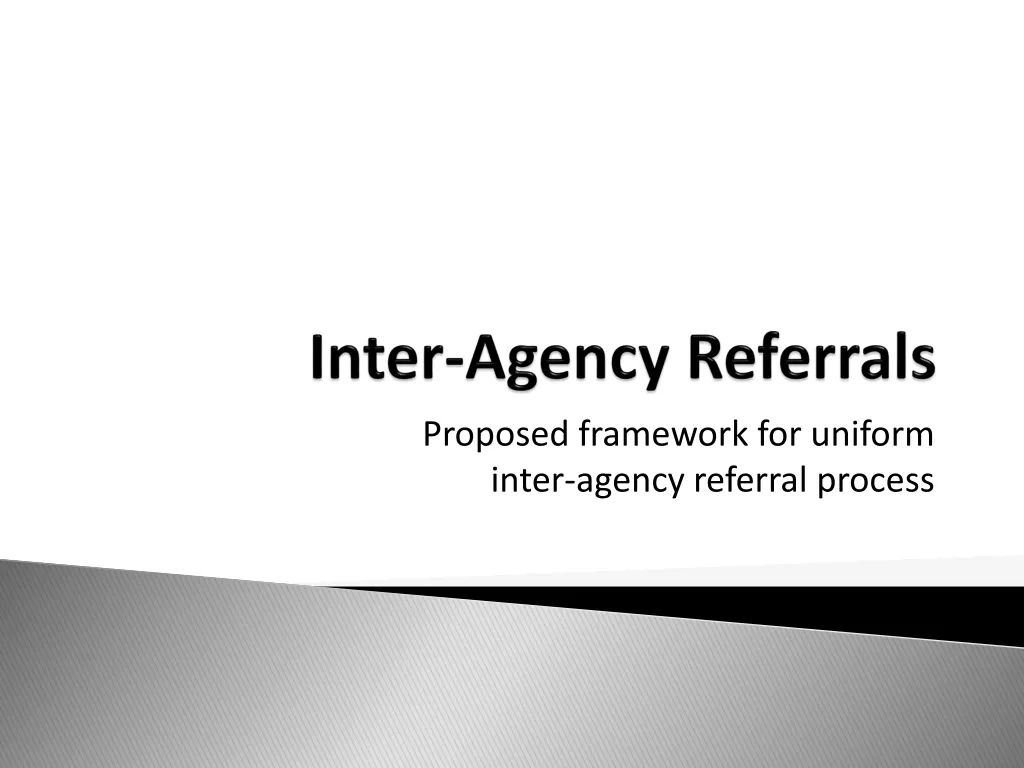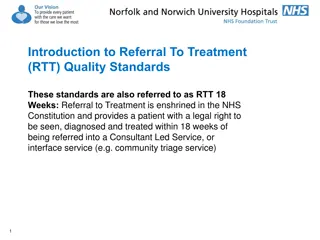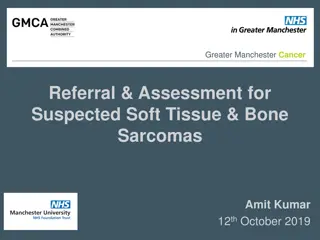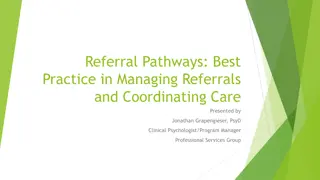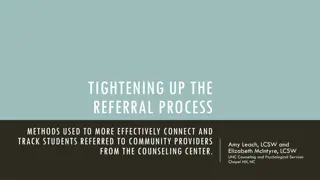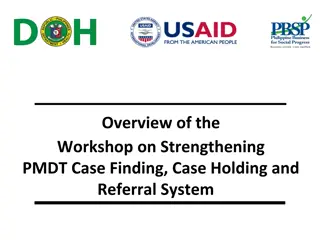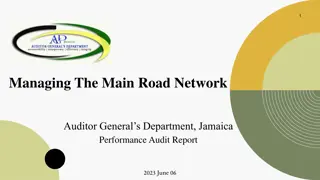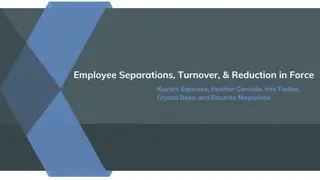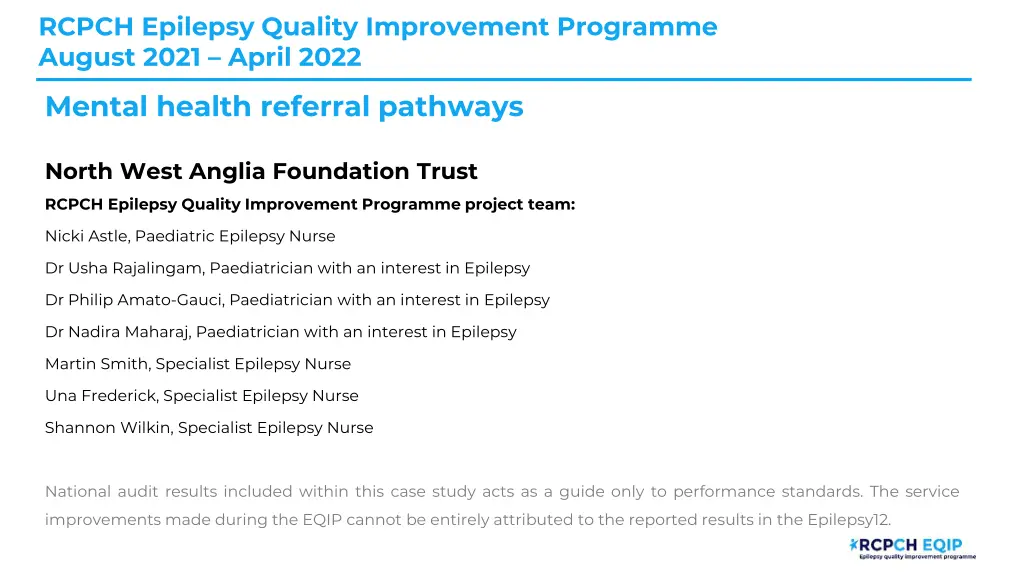
Improving Mental Health Referral Pathways in North West Anglia Foundation Trust
Enhance mental health support for children and young people in North West Anglia Foundation Trust through nurse-led clinics and effective signposting to external organizations and online resources. The project aims to address the lack of in-house psychology services by developing a pathway for patients to access relevant mental health support services easily.
Download Presentation

Please find below an Image/Link to download the presentation.
The content on the website is provided AS IS for your information and personal use only. It may not be sold, licensed, or shared on other websites without obtaining consent from the author. If you encounter any issues during the download, it is possible that the publisher has removed the file from their server.
You are allowed to download the files provided on this website for personal or commercial use, subject to the condition that they are used lawfully. All files are the property of their respective owners.
The content on the website is provided AS IS for your information and personal use only. It may not be sold, licensed, or shared on other websites without obtaining consent from the author.
E N D
Presentation Transcript
RCPCH Epilepsy Quality Improvement Programme August 2021 April 2022 Mental health referral pathways North West Anglia Foundation Trust RCPCH Epilepsy Quality Improvement Programme project team: Nicki Astle, Paediatric Epilepsy Nurse Dr Usha Rajalingam, Paediatrician with an interest in Epilepsy Dr Philip Amato-Gauci, Paediatrician with an interest in Epilepsy Dr Nadira Maharaj, Paediatrician with an interest in Epilepsy Martin Smith, Specialist Epilepsy Nurse Una Frederick, Specialist Epilepsy Nurse Shannon Wilkin, Specialist Epilepsy Nurse National audit results included within this case study acts as a guide only to performance standards. The service improvements made during the EQIP cannot be entirely attributed to the reported results in the Epilepsy12.
Mental health referral pathways North West Anglia Foundation Trust Project aim To create signposting processes to support patients' wellbeing and mental health via easily accessible applications and internet websites. Background The service has experienced a number of changes over the last few years, which included a merger of Trusts and new members of staff joining the service. They are seeking support in finding a way to work together effectively and to improve the service as a whole. Initially, the team planned to focus on transition and audit how many young people have been discharged into adult services and seen by the appropriate team. During the progress of EQIP, the team changed their project aim due to a lack of buy-in to achieving the aim by March and therefore focused on a practical and impactful aim of improving mental health support, which was identified as a cross-site service need for patients requiring psychological support, although there is no in-house psychology available. Area of focus The team plans to use patient engagement methods to understand the needs of children and young people to develop a signposting leaflet that provides details of relevant charities and organisations websites and apps that can provide mental health support.
Mental health referral pathways North West Anglia Foundation Trust Changes Introduced nurse-led clinics for engagement and follow-up discussions. Identified that children and young people within their service required psychological support, but there was no in-house psychology or intervention available. Therefore, the team planned to develop an efficient pathway to signpost patients to mental health support organisations and easily accessible applications and internet websites. The project was supported by colleagues with appropriate expertise from the CAMHS paediatric registrar and psychologist.
Mental health referral pathways North West Anglia Foundation Trust
Mental health referral pathways North West Anglia Foundation Trust Results Designed a questionnaire to be used with up to five children across each site and signposted them to apps and websites. The patients were called by a team member after two weeks to obtain feedback, and overwhelmingly, all children were sad about epilepsy. Modified questionnaire as all children were sad about epilepsy and asked another group of children if talking to someone would help identify the most suitable member of the team. Children felt they would benefit from talking to the epilepsy nurse. The questionnaire went through a number of iterations, which were modified to include feedback from children less than 11 years old. Some families preferred not to talk about their worries but were happy with being signposted to support organisations and websites. The team engaged with families, who helped identify further websites and apps that they felt were useful.
Mental health referral pathways North West Anglia Foundation Trust
Audit results cohort 3/4 agreed referral pathways North West Anglia Foundation Trust Currently North West Anglia service does not have agreed referral pathways for children with mental health concerns. 2019 2020 2021 2022 Does the trust have agreed referral pathways for children with mental health concerns? 2021 EPEN 2021 England & Wales 2022 EPEN 2022 England & Wales Anxiety No No No No 54% 60% 54% 64% Depression No No No No 54% 60% 54% 65% Mood disorder No No No No 54% 59% 54% 63% No No No No 38% 44% 54% 52% Non-epileptic attack disorder Other No No No No 0% 5% 0% 7% None Yes Yes Yes Yes 31% 34% 31% 30%
Audit results cohort 3/4 appropriate first assessment North West Anglia Foundation Trust The percentage of children and young people with consideration of emotional or behavioural problems increased to 90% in 2021, above regional and national averages, and 86% in 2022. evidence of description of Percentage of CYP with appropriate first paediatric assessment 100% 90% 80% 70% 60% 50% 40% 30% 20% 10% 0% 2019 2020 2021 2022 Age of child/timing of first episode Frequency General examination Neurological examination Developmental progress Emotional/behavioural problems Appropriate first paediatric assessment
Mental health referral pathways North West Anglia Foundation Trust Challenges The team found it difficult at times to find time as a team to make plans and move the project forward due to cross-site working. The team was made aware that formal services, such as CAMHS, were not always accepting referrals, and even if they were, patients would experience long waiting times. Challenges with participating in the EQIP across both sites with different teams and different patient populations. The team had to be adaptable and opportunistic to identify children over 11 years old within their epilepsy clinics due to logistics. The team struggled with staff absences, time constraints, and winter pressures.
Mental health referral pathways North West Anglia Foundation Trust Outcomes Using patient engagement methods, the team was able to identify their patients needs for mental health support based on the feedback received from children with epilepsy. The main area of concern for patients was worries and anxieties regarding epilepsy, and they wanted access to talk to someone. The team was able to develop a leaflet of relevant information that signposted children and young people to local and national mental health charities and organisations, along with recommended and useful apps to provide information and support. Cross-site working increased team communication due to having to work together to achieve the project aim, which led to being able to utilise patient cohorts from both sites. It was agreed that plans would be put in place to provide more support and training based on patient feedback for nurses to help meet the needs of children and young people and discuss with nursing line management regarding additional nursing time. The team plans to explore with the patients who requested to talk with the epilepsy nurses if they would be interested in speaking to a psychologist for additional support. The next step is to invite the children and young people who wanted support to form a working group where they provide their views on future service improvements to further support them in meeting their needs.
Mental health referral pathways North West Anglia Foundation Trust Lessons learnt Worked effectively together despite being geographically distant and working with different clinic set up, different staff, and different populations. It was identified that the nurses would take the opportunity to collect information as part of their consultation during normal clinic time, and designated roles were allotted to every team member. The EQIP team champion took the responsibility to ensure the team had an agreed-upon date to meet and sent reminders to help remain focused and targeted. There were agreed timelines and actions at every meeting to ensure that the project continued to progress throughout the programme. Meetings were kept short and happened during the lunch hours for people to attend, utilising Microsoft Teams and emails to work together across sites. Increased engagement and the ability to utilise peripheral members of the team, such as CAMHS and psychologists, when required.
https://eqip.rcpch.ac.uk eqip@rcpch.ac.uk @RCPCHEQIP

